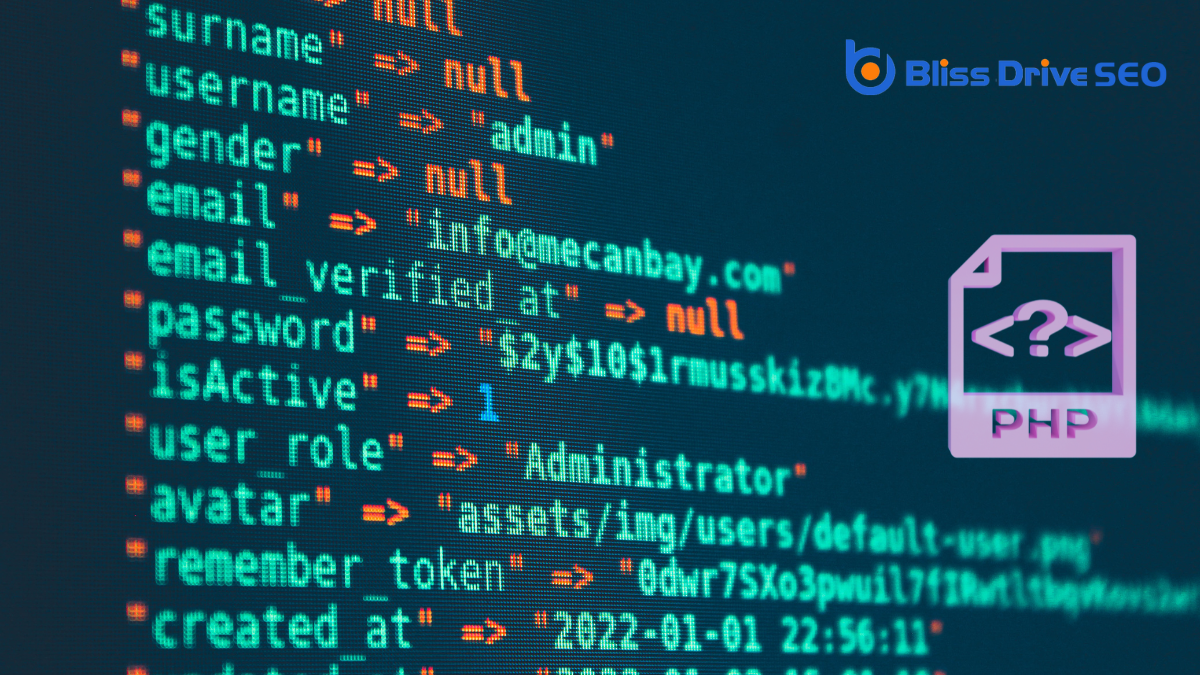Learn More About Us

You might think PHP is just another acronym in the tech world, but it actually carries an interesting evolution. Initially, it stood for "Personal Home Page," a humble beginning as a tool to track online resumes. However, as PHP grew in capability, its meaning shifted to "PHP: Hypertext Preprocessor," reflecting its advanced role in web development. This transformation hints at a deeper story about its journey from a simple script to a powerful language. So, how did PHP make this leap, and what does it mean for today's developers? Let's explore its path and potential.
PHP, originally standing for "Personal Home Page," was created in 1994 by Rasmus Lerdorf. You might wonder why he developed it in the first place. It all started with him wanting to keep track of visits to his online resume. To do this, he wrote a set of Common Gateway Interface (CGI) scripts in C language. These scripts were the foundation of what would become PHP.
As you explore PHP's beginnings, you'll see how it quickly evolved. Lerdorf's initial creation wasn't designed to be a full-fledged programming language. Instead, it was a simple tool to solve his specific problem. But as he shared it with others, interest grew. Developers saw its potential, and it began to expand.
In 1995, Rasmus released PHP Tools to the public, giving it a wider reach. This move allowed other programmers to contribute, and PHP started gaining functionalities beyond its original purpose.
You can appreciate the collaborative nature of its development, with various contributors adding features that make it more powerful and flexible. This community-driven growth set PHP on a path to becoming a major player in web development.

In the beginning, when PHP was introduced to the world, it stood for "Personal Home Page." This name reflected its initial purpose—helping individuals manage and personalize their own web spaces.
You'd use PHP as a tool to enhance the basic HTML of your website, giving you more control over how your website looked and functioned. It wasn't just about making websites more visually appealing; it was about giving you the power to create dynamic and interactive contentContent that requires user interaction, such as quizzes, polls, or calculators. that could respond to your visitors' actions.
Imagine having a simple way to track visitors or customize the information they see. That's exactly what PHP offered in its early days. It allowed you to add features like guestbooks, counters, and simple forms—all things that made a website feel more alive and engaging.
You didn't need to be a professional programmer to make these enhancements; PHP was accessible and straightforward, opening the door for many people to engage in web development.
You've probably heard PHP started as a "Personal Home Page," but that's not the whole story.
Over time, it morphed into a recursive acronym, now standing for "PHP: Hypertext Preprocessor".
This change reflects the language's growth and its broader role in web development today.
One might be surprised to learn that PHP originally stood for "Personal Home Page." When Rasmus Lerdorf first created it in 1994, PHP was a set of Common Gateway Interface (CGI) binaries written in C, designed to help him maintain his personal website. Its primary function was simple: track visits to his online resume.
As more people discovered its usefulness, PHP evolved beyond its initial scope, attracting a wider audience who sought to create dynamic web pages.
You might wonder why PHP gained popularity so quickly. At the time, creating interactive websites was a complex task, often requiring extensive programming knowledge. PHP simplified this, offering a user-friendly way to develop web content without exploring intricate coding.
Its ability to embed directly within HTML made it accessible to those who were already familiar with basic web design.
As you investigate PHP's origins, you'll appreciate how it laid the foundation for modern web development. By understanding its initial purpose, you can see how it transformed the landscape of the internet, enabling countless developers to create more engaging and interactive websites.
PHP's journey from a personal tool to a global phenomenon is truly remarkable.
As PHP grew in popularity and functionality, its original meaning, "Personal Home Page," no longer captured the essence of its capabilities.
PHP had evolved into a powerful tool that extended far beyond creating simple personal websites. This shift in scope called for a new name that better represented its role in the web development world.
The decision led to a clever recursive name change: "PHP: Hypertext Preprocessor."
The term "recursive" here means that the acronym includes itself as part of its definition. It's like a nod to the programming concept of recursion, where a function calls itself.
This name change reflects PHP's evolution into a robust server-side scripting language that processes hypertext, creating dynamic web pages.
PHP's journey from its humble beginnings to its current stature in web development is a demonstration of its adaptability and enduring relevance. Initially, PHP stood for "Personal Home Page," but as its functionality expanded, so did its name. It morphed into "PHP: Hypertext Preprocessor," reflecting its recursive nature and broader capabilities. This shift wasn't just about nomenclature; it signified PHP's evolution from a simple tool for personal use into a robust server-side scripting language.
You might wonder why this change matters. Understanding this evolution helps you see how PHP has grown to meet the complex needs of modern web development. It's no longer just about personal home pages; PHP powers dynamic websites handles databases and integrates with various technologies. The name change encapsulates this growth and the community's forward-thinking approach.
As a developer or a curious learner, recognizing PHP's modern interpretation can deepen your appreciation for its versatility. It's a reflection of how open-source projects can evolve over time, responding to user needs and technological advances.
PHP's story is one of transformation, underscoring its ongoing impact in the digital landscape.
When you think of PHP today, it's not just about "Hypertext Preprocessor" anymore.
Its meaning has expanded as the language has grown to support modern web development needs.
You'll find that PHP now embodies flexibility and power, making it an essential tool for crafting dynamic websites and applications.
Though many people recognize PHP from its humble beginnings as a "Personal Home Page," its meaning has evolved considerably over the years. Today, PHP stands for "PHP: Hypertext Preprocessor," a recursive acronym that reflects its growth beyond simple web pages. This shift signifies PHP's transformation into a robust scripting language that plays an essential role in web development.
If you're diving into PHP now, you'll find it's not just about serving static pages; it's about dynamic contentEmail content that changes based on the recipient's preferences or behavior., server-side scripting, and integrating with databases like MySQL.
As a developer, you might appreciate how PHP's modern capabilities allow you to build complex web applications efficiently. It's been enhanced to handle tasks like session management, form processing, and user authentication with ease. PHP's evolution means you can leverage frameworks like Laravel and Symfony, which streamline development and introduce best practices.
PHP's evolving meaning also embraces its thriving community and open-source nature. You're not alone in your journey; vast resources and forums are at your disposal. As you explore PHP, you'll see how its evolution has made it a versatile tool that adapts to the ever-changing demands of web technology.
Often, PHP's modern interpretation extends far beyond its original scope as a hypertext preprocessor.
You've probably noticed that PHP now plays a vital role in a variety of web development tasks. It's not just about generating dynamic web pages anymore; it has expanded into a versatile tool that can handle a lot more.
Let's dig into some of the ways PHP has evolved and what it can offerThe specific product or service being promoted by affiliates. you today.

PHP plays an essential role in web development by providing the server-side scripting capabilities needed to create dynamic and interactive websites. When you build a website, you want it to do more than just display static content. PHP lets you create features like user registration, login systems, and data handling, making your website responsive to user interactions.
You'll find PHP embedded within HTML, which allows for seamless integration with your existing web pages. This means you don't have to start from scratch; instead, you enhance your site's functionality with PHP scripts.
PHP is particularly useful for managing databases. By using PHP, you can connect your website to databases like MySQL, enabling you to retrieve, store, and update data efficiently. This is vital for e-commerce sites, content management systems, and any application requiring data manipulation.
Additionally, PHP's versatility means it's compatible with most web servers and platforms, which gives you flexibility in your development environment. With a vast array of pre-built modules and frameworks, PHP accelerates the development process, saving you time and effort.
Understanding PHP's role in web development equips you to create more engaging and functional websites for your users.
As you've seen, PHP greatly enhances web development by making websites dynamic and interactive.
Looking ahead, the future of PHP holds promising developments. You can expect continuous improvements in performance, which will make your web applications faster and more efficient. With PHP 8, new features and optimizations have already set the stage for an exciting future.
To prepare for what's next, consider these key points:
You've seen how PHP evolved from "Personal Home Page" to "PHP: Hypertext Preprocessor," transforming into a powerful tool for web development. With its ability to create dynamic websites by embedding PHP in HTML and integrating with databases like MySQL, PHP has become indispensable for developers. As you look to the future, PHP will continue to adapt, ensuring it remains a crucial part of web development's ever-changing landscape. Embrace PHP's flexibility and power in your projects!
